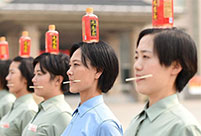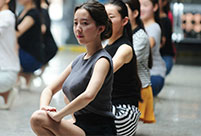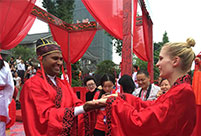

TIANJIN, Sept. 9 (Xinhua) -- Each year during summer holidays, Iwao Takei, a Japanese medical professor at Hokuriku University, organizes a cultural exchange trip for his students to Tianjin Foreign Studies University in Tianjin Municipality, a metropolis 60 miles to the southeast of Beijing.
So far, 280 Hokuriku undergraduates have studied Chinese in Tianjin.
Takei, 61, has visited many other Chinese cities since he first set foot in the country in 1990.
He said that year meant a lot to him. Takei married his wife then, just as Japan began to feel the pain of economic stagnation. "Young couples at that time preferred fabulous Western scenic spots for their honeymoons, but we chose to visit China," Takei said.
"It was really unusual during that time, but I still relish that sweet experience," Takei said.
Contact between ordinary Japanese and Chinese people was rare at the time, and they knew little about the reality of common people's lives in each other's countries.
Takei said China was utterly different from what Japanese media portrayed at home. "China boasts a lot of wonderful places and the people there are really friendly," said Takei. "Young people always offer their seats to the elderly, which is never seen in Japan."
Kunio Inayama, an assistant professor also with Hokuriku University, said he considers Tianjin his second hometown.
Inayama, 47, said Tianjin shares many similarities with his hometown of Osaka, where the people are outgoing and love humor.
Inayama said he has visited Tianjin 14 times, and he bases his understanding of China on his own experience, rather than just following the Japanese media's reporting.
When he heard the shocking news of the Tianjin blasts in August, Inayama immediately called his local friends in the city to find out the truth. Upon hearing that urban Tianjin was safe, he stuck to his original plan and brought his students to study in Tianjin.
Inayama is also a fan of Chinese traditional musical instruments, and can perform Chinese songs on the musical saw. He even organized two musical saw performances back in Japan to raise funds for Tianjin disaster relief.
"It was not too much money, but I sincerely wish to help as many Tianjin citizens as possible," Inayama said.
Taiga Yamamoto, 19, was a complete stranger to Tianjin when he arrived to Tianjin to study Chinese this summer. The sophomore at Aichi Shukutoku University said it was his first overseas experience.
"My friends back home were wondering why I came to China instead of the more developed Europe or the U.S.," Yamamoto said. "But once you are here, you will find Tianjin is a very livable and amiable place with perfect security and order."
Yamamoto said he and his friends had the impression from Japanese media that Chinese are radical and aggressive.
"But now with my own experience, I find that is totally biased," Yamamoto said. "Most of the Japanese coverage on China is negative, and I think they should report more on the bright side of China to promote bilateral relations.
Yamamoto said he is now working hard in his Chinese courses and hopes to find a job in China or a Japanese airport after graduation. "There are many foreign travelers in the airport, and I would have the chance to use my ability to speak Chinese," he said.
 Models change clothes on street in Hangzhou
Models change clothes on street in Hangzhou Charming iron ladies in China's upcoming V-Day celebrations
Charming iron ladies in China's upcoming V-Day celebrations In pics: armaments displyed in massive military parade
In pics: armaments displyed in massive military parade Charming Chinese female soldiers
Charming Chinese female soldiers Volunteers required not taller than 5ft 5in
Volunteers required not taller than 5ft 5in  Czech pole dancing master teaches in Xi'an
Czech pole dancing master teaches in Xi'an Shocked! PLA smokescreen vehicle drill
Shocked! PLA smokescreen vehicle drill Foreigners experience tranditional Chinese wedding
Foreigners experience tranditional Chinese wedding Blind date with bikini girls in Nanjing
Blind date with bikini girls in Nanjing The lows of getting high
The lows of getting high  China vows rule of law in Tibet
China vows rule of law in Tibet  Refugee crisis diminishes US leadership
Refugee crisis diminishes US leadership Proud, not so loud: Uganda’s secret LGBT beauty contest
Proud, not so loud: Uganda’s secret LGBT beauty contest Day|Week